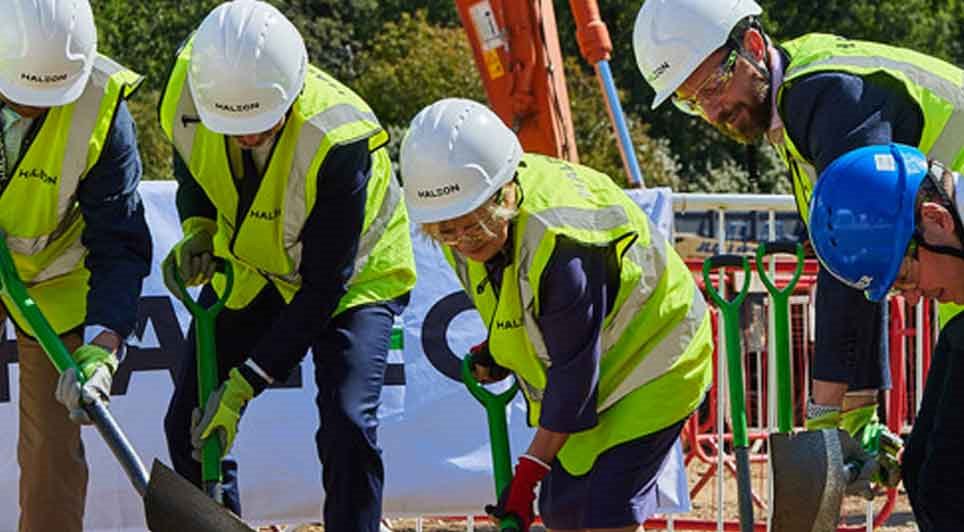The industry skills crisis will soon be a bigger barrier to delivering new homes rather than access to finance, according to the Federation of Master Builders (FMB).
The organisation's latest House Builders' survey reveals how 44% of SME house builders believe a shortage of skilled workers is a major barrier to their ability to build more new homes, up from 42% in 2017.
In addition, nearly half (46%) stated access to finance is a major barrier, while 59% cited a lack of available and viable land as a problem for housing delivery. Almost two-thirds (62%) also believe that the number of opportunities for small site development are actually decreasing, up from 54% in 2017.
Furthermore, more than half (51%) view the planning system as a major constraint on their ability to grow and 'inadequate resourcing of planning departments' was again rated as the most significant cause of delay in the planning application process for the third year in a row.
On their future outlook, more firms cited skills shortages as a likely barrier to growth than access to finance.
Brian Berry, Chief Executive of the FMB, said the construction sector is heavily reliant on EU workers, with just under one in ten workers in the sector born in the EU.
"Brexit, coupled with the end of free movement, threatens to further intensify the skills shortages we already face," he said.
"Given that the UK will leave the EU in less than six months, house builders are understandably concerned that skills shortages could worsen and choke housing delivery. In order to combat this skills crisis, the construction industry needs to encourage more entrants into the industry and develop higher quality qualifications. It is critical therefore that the Government doesn't pull the rug out from under the sector by introducing an inflexible and unresponsive immigration system."
Mr Berry continued: "Research also shows that the Government must continue to address the issue of access to finance for SME house builders. Although concerns over access to finance have eased slightly in recent years, in part thanks to the Government's funding schemes such as the Home Building Fund, there is more that can be done.
"Our research suggests that it is the low percentages of project cost that builders are able to borrow that remain the greatest financial barrier to increasing their levels of house building.
"This latest research suggests that if firms were able to borrow 80 per cent, rather than the current 60 to 65 per cent of project cost, SME builders would be able to bring forward on average 40 per cent more new homes. Given the ambitious house building targets the Government is working towards, we cannot afford to ignore such a chance to significantly increase housing delivery."
Mr Berry added for the fourth year in a row, a lack of available and viable small sites tops the list of frustrations for SME house builders.
"Worse still, nearly two-thirds of these small builders believe that the number of opportunities for small site development are decreasing," he said.
"However, the recent reforms to the National Planning Policy Framework, which specify that 10 per cent of a local authority's housing delivery must be on sites no larger than one hectare, will help to address this problem. This will help to speed up the delivery of homes and lead to a more diverse and resilient housing supply."
(LM/CM)
Construction News
12/09/2018
Industry Skills Crisis Continues To Impact Housing Delivery - FMB


09/07/2025
Network Space Developments has formally submitted an outline planning application to redevelop the former Cadent Gas Works site on Winwick Road, just north of Warrington town centre.
The plans propose up to 100,000 sq ft of high-quality employment space, intended to accommodate a range of industria

09/07/2025
The City of London Corporation has granted planning permission for two major high-rise schemes at opposite ends of the City's historic skyscraper cluster, reinforcing the Square Mile’s reputation as a global business and cultural hub.
The approved projects, a 45-storey tower at 63 St Mary's Axe and

09/07/2025
Construction firm Kier has signed a Pre-Construction Services Agreement (PCSA) with global healthcare company Haleon to deliver a state-of-the-art Oral Health Innovation Hub in Weybridge, Surrey.
The landmark project, announced by the UK Government during its International Investment Summit, will p

09/07/2025
One of the UK's largest housebuilders, Persimmon Homes Severn Valley, has submitted detailed proposals for the construction of 562 new homes in Cribbs Causeway, as part of the next phase of its major Fishpool Hill development near Bristol.
The latest reserved matters applications cover phase two of

09/07/2025
The Transpennine Route Upgrade (TRU) has reached a significant milestone, following five consecutive weekends of intensive engineering work between Leeds and York to advance electrification of the line.
As part of the ongoing upgrades, engineers have now installed 7.5 kilometres of overhead line eq

09/07/2025
Plans to transform the Teviot Estate in Poplar have reached a major milestone, with Tower Hamlets Council granting a resolution to approve the £800 million redevelopment at its Strategic Development Committee meeting on Tuesday, 8 July.
The Hill Group and housing association Poplar HARCA are leadin

09/07/2025
Wates has joined Stepnell, Morgan Sindall, Kier, and BAM as a Gold Corporate Partner of the Centre for Construction Best Practice (CCBP), marking a major milestone in efforts to improve collaboration, innovation, and delivery standards across the UK construction sector.
The five major contractors a

09/07/2025
Roger Bullivant Limited (RBL) has been appointed by main contractor McLaren to carry out piling works for a new Boxing Academy and school development in Hackney, East London.
The high-profile project, commissioned by the Department for Education and the Boxing Academy Trust, will transform an unfin

09/07/2025
Key redevelopment projects at Central Library and Peterscourt, part of the wider Vine Towns Fund initiative, are set to move forward as Cabinet prepares to review an update and approve contracts at a meeting on 15 July.
The update outlines the final phase of the £25 million Vine project, which is p

09/07/2025
Seven of the UK's largest housebuilders have offered a combined £100 million settlement in response to a Competition and Markets Authority (CMA) investigation into alleged information sharing practices that raised competition concerns.
The CMA launched the probe last year amid suspicions that Barra
 UK
UK Ireland
Ireland Scotland
Scotland London
London











